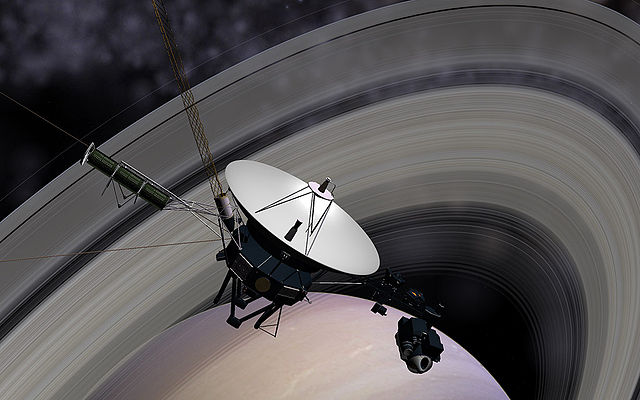What is the Voyager
Written by Manya Pandey, a first-year undergraduate student.
Voyagers are a set of space probes – Voyager 1 and Voyager 2 that were launched into space by NASA in 1977 to study the outer Solar System and interstellar space beyond the Sun’s heliosphere
Written by Manya Pandey, a first-year undergraduate student.
Did you know – 40 years ago the US sent two spacecraft into space, and they’re still exploring space?
Here’s all about it.
Voyagers – the longest-running spacecraft in cosmic history
Voyagers are a set of space probes – Voyager 1 and Voyager 2 that were launched into space by NASA (an American space agency) in 1977 to study the outer Solar System and interstellar space beyond the Sun’s heliosphere – which is the outermost atmospheric layer of the Sun.
Voyager 1 was sent to carry out a closer inspection of Jupiter and Saturn, while Voyager 2 was sent to Uranus and Neptune to collect data and send it back to Earth.
45 years later, the Voyagers are still in operation and have gone past the outer boundary of the heliosphere in interstellar space!

The Voyager twins left the safety of our sun long ago and are now wandering way farther into the undiscovered interstellar space!
Interstellar space is the cosmic area between the stars, filled with substances emitted by dying stars. Simply put, voyagers are outside of our sun’s influence and they’re the first ones to go that far.
Here’s more
The funny thing is that even though Voyager 2 was named 2, it actually launched first! But interestingly, Voyager 1 crossed over to interstellar space before the 2 – on August 1, 2012! This was primarily because of the shorter route it took. NASA marked the 40th anniversary of Voyager 1 on September 5, 2017.
Would you believe it? Voyagers were designed to last only five years! Because they were initially created for a two-planet mission.
How did it begin?
The primary mission of the voyager program was the close-range exploration of the rings and moons of Jupiter and Saturn.
Voyager 1, which reached Jupiter in April 1978 began taking pictures at a distance of 165 million miles. It clicked about 1 picture every 96 seconds for 100 hours and made remarkable discoveries there including a thin ring around Jupiter and active volcanoes on its moon named Io.

It also sent back detailed images of Saturn’s rings. After such extraordinary missions, NASA extended the mission and sent Voyager 2 to Uranus and Neptune to explore.
Afterward, our space conquerors were dispatched on Voyager Interstellar Mission (VIM) to explore outside the sun’s arena officially in August 1990.
Interestingly voyager 2 is the spacecraft to have flown at a close range to those outer planets.
Both spacecraft continue sending valuable scientific information through the Deep Space Network(DSN). It’s a spacecraft network that connects earth to spacecraft via antennas
What is Voyager Interstellar Mission (VIM)
In 1990, NASA redirected the voyagers toward interstellar space under the Voyager Interstellar Mission (VIM).
Voyager 1 entered interstellar space in August 2012. Soon after they turned off the cameras to save energy and storage for the boundless mission ahead. The voyager last captured 67 thousand images of our solar system that were all merged to form a “Solar System Family Portrait”(even though mercury that was too close to the sun and mars that were behind the sun are not present)
This last image was called “Pale Blue Dot“.

After taking a farewell memory, voyager one entered the heliosheath, it’s an outer layer of the sun’s atmosphere (the heliosphere). On 25 August 2015, the spacecraft finally exited the heliosphere and entered a no-man’s-land that we now know as interstellar space.
The aim of the mission
The interstellar mission was launched mainly to broaden the horizons of space exploration but it also aimed at collecting data on the transition from the heliosphere to the interstellar region.
Fun fact- Voyager has a message for aliens!
Each Voyager has a message from humanity written on a gold-plated copper record. It was prepared by a team of scientists headed by American astronomer Carl Sagan. The message contains greetings in 55 languages, pictures of our people, and places, and music for the extraterrestrials who might find the spacecraft. It also contains a recorded map to locate Earth, in case they decide to pay us a visit or a signal.
Headline Image: https://upload.wikimedia.org/wikipedia/commons/d/d7/Voyager_
1%27s_view_of_Solar_System_%28artist%27s_impression%29.jpg
Attribution: NASA, ESA, and G. Bacon (STScI), CC BY 4.0 https://creativecommons.org/licenses/by/4.0, via Wikimedia Commons
I Kid You Not has a large readership across India and also parts of the world. If you want to write for us, you can submit your story here. You can also apply to become a news anchor. Apply here



Comments